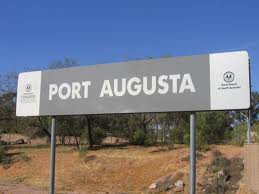To Greg Bourne, chair of The Australian Renewable Energy Agency, and Jeff Dimery, CEO of Alinta Energy.
Dear Mr Bourne and Mr Dimery
Imagine yourselves as citizens of Port Augusta. You have suffered coal combustion pollution for years, relatives have died from heart or lung disease and your child has asthma. You are committed to the town and your job.
If you were a doctor and this community was your patient, imagine having to tell them that the government had decided they could not have a recognised treatment for cancer, worse still it offered no explanation.
Furthermore, you as Port Augustans had no say in this matter, apparently the decision not to allow a feasibility study for clean air was decided on the basis of an application by Alinta that mines and burns brown coal and may want to continue doing so because it is spuriously cheap. You are not allowed to see the application, presumably because breach of confidentiality might harm the shareholders of Alinta, whose rights in this wealthy country come before yours.
Let us look at the medical facts of pollution in Port Augusta. They have been documented by Doctors for the Environment Australia and presented to a select Committee of the SA Parliament.
The case for clean air at Port Augusta is supported by the Australian Medical Association (AMA) SA, Royal Australian College of General Practitioners (RACGP), Public Health Australia Association (PHAA) and most recently the Royal Australasian College of Physicians (RACP). The medical case against coal becomes stronger every day as it become apparent that there is no safe level for particulates in the air.
Port Augusta is a deprived regional town with limited occupational opportunities. It has tolerated its health burden because it provided much of SA power in days when there was no alternative. Today, there are clean alternatives and the Port Augustans read about solar thermal forging ahead in other countries offering new technology and a pollution free life. It is just the type of innovation that would give this town a future. Good health is based not only on clean air but on satisfying stable jobs and hope for the future.
Let us look at the economic facts. In true accounting, coal is an expensive fuel; an analysis of health costs due to coal in the US, Europe and Australia demonstrates this. Yet ministers and others give us homilies about cheap coal and market forces; this is humbug.
No doubt ARENA has worked according to its remit, and Alinta has worked in its commercial interests. The role of ARENA epitomises many other failures in this country; the board has little expertise in anything other than energy yet it is dispensing one of the world’s greatest preventative health needs to Australian communities. It delivers solutions to communities whose voice is not heard.
Mr Bourne, on behalf of ARENA your answers to a series of questions would be of great interest and importance to the community.
What health inputs did ARENA obtain before making its decision? Were attempts made to obtain a community viewpoint in addition to an industry submission? Why have you not made the Alinta submission available for scrutiny? And what is your criticism of the application? Were the costly externalities of continuing brown coal usage considered versus the inevitable decreasing cost of renewable energy.
Despite the limitations of ARENA’s remit in being appointed by a Minister for Energy, what representations have you made to governments to have a more holistic interdisciplinary approach to these assessments? With economic expertise on the ARENA Board, what advice has been offered to the Minister on externalities and alternative funding bearing in mind that many Australian institutions are offering massive funding to fossil fuel miners.
We note that through WWF you must have gained experience in community needs and consultation and in the importance of environmental and health accounting; what would you be saying and doing as a Port Augustan with a child with asthma?
We ask you to state your position on this issue and to accept that we and many other community organisations are here to advise you night and day, and as voluntary workers we have no conflict of interest.
Mr Dimery, Port Augusta has served Alinta well, surely your commercial interest puts you in a conflicted position on this issue and therefore your application should be available for public scrutiny. Whatever the state of air quality in Port August is at present, medical science will tell you the quality is not good enough as long as Alinta burns coal.
Finally, the questions for governments, which to date have not shown much interest in the issue, it has become much easier for others to make the difficult decisions. Minister Butler and several other Ministers have declined to discuss the issue on more than one occasion.
Solar thermal for Port Augusta symbolises the disenfranchisement of community over resource development across Australia. Resource issues have become an unhealthy and costly war between industry and conflicted governments on one side and communities, doctors and environmentalists on the other. Thousands and perhaps hundreds of thousands of hard working, committed citizens are locking the gate because their concerns have no voice.. The question is therefore what are you going to do about it in the interests of community, industry and good governance?
We look forward to your answers.
Dr David Shearman FRACP
Hon Secretary, Doctors for the Environment Australia








